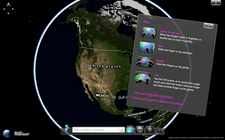 Lonely Planet spent a lot of money developing applications for Microsoft Surface but have yet to roll one out anywhere. Many expected it in their new store at Sydney Airport (their only store in the world) but from comments made on Twitter it appears the timeline couldn’t be met and it “might” show up some time later.
Lonely Planet spent a lot of money developing applications for Microsoft Surface but have yet to roll one out anywhere. Many expected it in their new store at Sydney Airport (their only store in the world) but from comments made on Twitter it appears the timeline couldn’t be met and it “might” show up some time later.
In the meantime, Microsoft have let out of the bag, copies of the new Windows 7 touch which incorporates many of the features of Surface but without the need for the $20k table. It can be run on any touch enabled screen.
Gizmodo just posted a video showing how cool the apps are that it comes loaded with.
Windows 7 Touch Pack: Surface Without the Big-Ass Table from Gizmodo on Vimeo.
Whilst these indeed look like they’ll be a lot of fun, in and of themselves they don’t have a lot of application in a retail environment. But thats not the point really, they are just demonstrations of the capability of the software. What they do show is the capacity for multitouch (ie multiple simultaneous inputs), dynamic arranging & resizing of images on the screen, pinning data etc. The capacity to do these types of things within Windows 7 touch should open the door to third party developers to create applications which enable a far more interactive touch experience with instore digital media & signage.
 Don’t get me wrong, the Microsoft Surface is great but it is restricted by being a table and by being very expensive. Taking the technology of Surface and enabling it to be run on any touch enabled screen will no doubt move this from being a novelty to being something we will inevitably see in many retail environments.
Don’t get me wrong, the Microsoft Surface is great but it is restricted by being a table and by being very expensive. Taking the technology of Surface and enabling it to be run on any touch enabled screen will no doubt move this from being a novelty to being something we will inevitably see in many retail environments.


